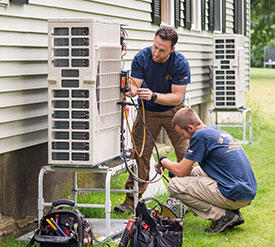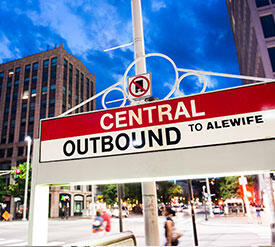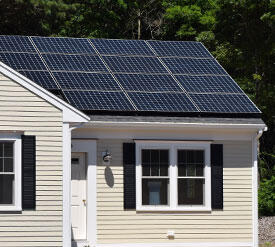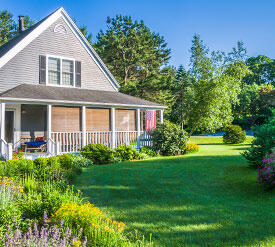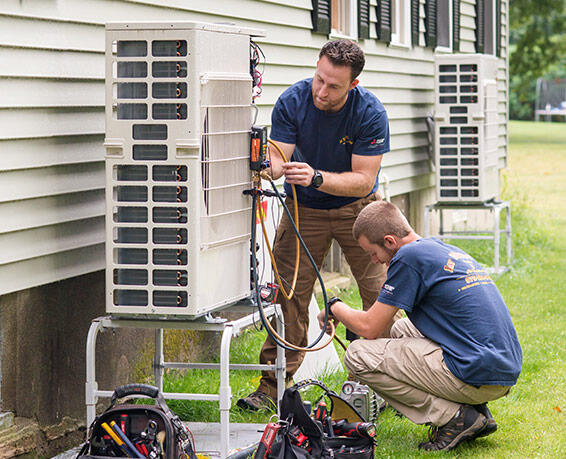In Your Home
The typical household in Massachusetts spends about $1,900 annually on energy bills. Almost half of those bills are due to heating and cooling. Keeping your home comfortable year-round doesn’t have to be harmful to the environment or your wallet. See how you can take action below.
Massachusetts Energy Savings Finder
Are you looking for affordable ways to reduce your home energy use and reliance on fossil fuels?
The Massachusetts Energy Savings Finder free search tool helps you identify local, state and federal rebates, incentives and tax credits for Massachusetts homeowners and renters. The MA Energy Savings Finder is brought to you by the Massachusetts Community Climate Bank (powered by MassHousing), Rewiring America and Abode Energy Management in partnership with the Massachusetts Clean Energy Center, Executive Office of Energy and Environmental Affairs, Mass Save Program Administrators, City of Boston, Massachusetts Municipal Wholesale Electric Company and Energy New England.
Learn more about this new tool: Massachusetts Energy Savings Finder
Get a Home Energy Assessment
Get started with a no-costMass SaveHome Energy Assessment to uncover savings opportunities and access rebates and incentives. During the assessment, your Energy Specialist will identify opportunities to save energy and recommend energy-efficiency solutions for your whole home.
Some of the incentives and rebates you may qualify for include:
- 75% to 100% off approved insulation improvements.
- No-cost targeted air sealing.
- Rebates up to $25,000 on qualifying energy-efficient equipment.
- 0% interest financing through the Mass Save® HEAT Loan Program for eligible upgrades up to $50,000.
Sign up for a No-Cost Energy Assessment Today: Customers of Berkshire Gas, Cape Light Compact, Eversource, Liberty, National Grid & Unitil | ENE customers | NextZero Customers
Federal tax credits for home improvement upgrades may be available to you. Learn More →
Weatherize Your Home
Once you complete a no-cost Home Energy Assessment, it’s time to start making home upgrades that reduce energy usage and save you money.
Weatherization is one of the simplest—and most affordable—ways to reduce your energy bill and keep your home comfortable year-round. Sealing air leaks and adding insulation to your home ensures there are as few gaps as possible for heat to escape in the winter or enter in the summer.
Install an Air-Source Heat Pump
Air-Source Heat Pumps can be a flexible, cost-effective, and energy-efficient option for both heating and cooling your home. Learn how to save money and energy year-round while improving home comfort and indoor air quality.
Install a Heat Pump Water Heater
Heat Pump Water Heaters are three times more efficient than conventional hot water systems and can lower operating costs by up to 50%. They also lower greenhouse gas emissions compared to heating water with oil, propane, natural gas, or electric resistance.
Get Help with Energy Bills
Need help reducing your energy bills? The Sponsors of Mass Save offer deeply discounted energy efficiency services to income-eligible households across Massachusetts and interest-free financing opportunities for homeowners and landlords. Homeowners and renters may also be eligible for financial assistance on their winter heating bills through the Home Energy Assistance Program (HEAP). Learn more and find out if you qualify:
Income Based Offers | Income Eligible Offers | Mass Save HEAT Loan | Renter Opportunities
Flooding and Stormwater Management
Climate change can increase the frequency and intensity of tidal and storm-related flooding. Access tools, templates, and other resources in the links below and learn how you can take action.
MVP Program Transferable Tools | Access Homeowner Stormwater Resources | Access Homeowner Flooding Resources | StormSmart Properties
As flooding becomes more frequent and severe, more Massachusetts homeowners will experience flood damages. Flood insurance is an important tool that can help residents avoid financial hardship in the aftermath of flooding. Standard homeowner insurance policies generally do not cover flooding, and many people are unaware of this fact. For more information or to find an insurance agent near you who sells flood insurance, visit the links below, or call the NFIP toll-free number at 1-888-356-6329 (TTY 1-800-427-5593). Multilingual operators are available (press 2 for Spanish)

On the Go
How we get from point A to point B plays a big role in carbon emissions. Whether it be your commute to school, work, or to see friends and family, the Commonwealth is investing in transportation options that help reduce the carbon emissions associated with travel.
Electric Vehicles
If you are considering buying a new car, electric vehicles (EV) are a great way to reduce your greenhouse gas emissions, improve air quality, and reduce the cost of owning a vehicle. The Commonwealth is making it easier to own an EV by adding thousands of public charging stations around the state. Incentives and financing options may be available to assist you in purchasing an electric vehicle and installing an EV charger at home.
The Massachusetts Clean Energy Center is offering direct support to talk with their team at 888-391-4959 or EV@masscec.com | Monday – Friday, 8 A.M. to 5 P.M. EST about findings incentives and rebates, cutting your fuel spending, lowering upkeep costs, and reducing emissions. This resource has translators for 250+ languages, so all are welcome to call or email.
Public Transportation
The MBTA and Regional Transit Authorities offer a range of services to help riders travel locally and regionally. Fixed route services (like the bus and subway) have a reliable regular schedule you can count on and offer discounted fares for seniors and people with disabilities.
Bikes, E-Bikes and E-scooters
Reducing our use of gas-powered vehicles is a key step in tackling climate change. Bikes, E-bikes, and E-scooters produce zero emissions and are much less expensive than cars.
Learn about e-bike benefits | Learn about Boston’s bike share program

From the Sun
There are many ways to harness the power of clean energy to generate electricity and reduce or even eliminate your electricity bills.
Residential Solar
If your home has available roof or ground space that gets good sun exposure, you can transform your home into a powerhouse of clean energy, slashing or eliminating your electricity bills and reducing your carbon footprint. Learn about residential solar
Community Solar
If you don’t own a home or don’t have the space for solar panels, subscribing to a local community solar farm is a great way to enjoy clean energy benefits without the upfront costs, lowering your electricity bills and greenhouse gas emissions.

In Your Yard
Whether you have acreage of forest or just a sidewalk strip, you can put your outdoor space to work to remove carbon emissions.
Plant & Maintain Trees
One simple and affordable option is maintaining existing trees and planting new ones. Trees help remove carbon emissions from the air, help cool communities from rising temperatures, and store water to reduce inland flooding.
There are several programs dedicated to helping you steward your forests (big or small).
See if you qualify for free trees | Learn more about managing your forested land

In Your State
The Commonwealth Has a Plan, and You Can Help:
Climate change is affecting every part of our state, from the environment, to our communities, to our own homes and health. But we aren’t just accepting these changes; we have an ambitious climate action plan to tackle the effects of climate change and protect our way of life.
The Commonwealth has developed the Clean Energy and Climate Plan (CECP) for 2025 and 2030,the CECP for 2050 to reduce our use of fossil fuels for heating our homes, powering our vehicles, and running our electric grid by 2050, and the ResilientMass Plan for hazard mitigation and climate change adaptation. As we work towards a healthier, cleaner, and more equitable Massachusetts, it's important to remember that everyone, including you, plays a crucial role.
Together, our actions over the next ten years can create an affordable and strategic shift for all residents.
Learn about Massachusetts's clean energy and climate goals
Preparing for climate change won’t happen overnight—and while we’re committed to achieving our goals in the future, in the present many of us in Massachusetts are struggling with the impact climate change has on our homes, health, and livelihood. Increasing your climate resilience can help mitigate the impacts in the immediate future.
Community-Based Initiatives:
Municipal Vulnerability Preparedness Program (MVP) works with communities across the state to identify climate hazards, assess vulnerabilities, and develop and implement action plans to improve resilience to climate change.
Learn about Municipal Vulnerability Preparedness
MVP 2.0 is a grant for municipalities to revisit their climate resilience priorities with a focus on equity and translate those priorities into action.
Massachusetts farmers are leaders in Climate Smart Agricultural Practices that help to build a resilient and safe food system. Despite constant climate change, farmers are adapting and making local agriculture even stronger. Small changes make a big difference, visit local farms and farmers markets in routine grocery runs to color your plate with Massachusetts products and crops.
Learn how to support your local famers and our food system here
State-Based Initiatives:
ResilientMass is the Commonwealth’s initiative for building statewide climate change resiliency by providing funding, localized climate change science and data, and decision support tools for the Commonwealth.
